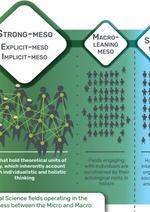Green Deal Researchers See a New Approach Driving Climate Action

Whether climate change is best addressed at the systemic level or the individual level has been debated since the environmental movement began. However, a new research paper by Social Science and Humanities (SSH) researchers argues that a middle ground is increasingly taking root in the way we approach climate action.
In the paper, ‘The Meso Multiple in energy and climate research: How different Social Sciences treat the in-betweenness between the micro and macro,’ the researchers argue that the longstanding debate between systemic and individualistic approaches is increasingly being bridged by the so-called ‘Meso’.
Chris Foulds, Professor of Sustainability and Society at Anglia Ruskin University and lead author of the paper, explains:
“Climate action is complex, and it is increasingly being recognised that we cannot solve the issue only through targeting systemic and infrastructural change, nor by focusing on the actions of individuals. We need to bridge them, and that’s essentially what the Meso does. It helps navigate the vast space in between, and a better understanding of that space can help create change.”
In the paper, the researchers—including social scientists from ICS ULisboa and Aalborg University—introduce specific definitions and terminology for different approaches to working with the Meso, aiming to help researchers find common ground and a shared understanding.
From Research to Action
A key argument made in the paper is that while the Meso is increasingly considered in theoretical discussions - and often applied in practice - researchers tend to approach it from very different perspectives, with the potential to lean toward the micro or macro to varying degrees.
Of these, the paper especially explores four versions of the Meso: Micro-leaning, driven by Pro-environmental Behaviour research; Macro-leaning, driven by Transition research; Implicit-meso, driven by Social Practices research; and Explicit-meso, driven by the Scale and Place field. The paper clarifies that this divergence is not necessarily problematic, but it calls for greater transparency and reflexivity in discussions on the specific version(s) of the Meso being enacted in research.
This, combined with more practical efforts in the real world, is crucial to achieving meaningful change, explains Professor Foulds:
“If Meso approaches are to be used in policy and practice, we must first recognise that there is no single Meso approach and certainly no one-size-fits-all solutions here. From this starting point, there is an opportunity for frank discussion and reflection on the assumptions people hold—including how and why they act the way they do.”
You can read the article in Energy Research & Social Science on ScienceDirect, or explore how SHARED GREEN DEAL is engaged in real-world experiments using varied Meso approaches through the different Green Deal Priorities on the project website.
Related Green Deal Priorities
Related multimedia
Related Resources


CONTACT
For further details please contact co-leads Professor Chris Foulds (chris.foulds@aru.ac.uk) and Professor Rosie Robison (rosie.robison@aru.ac.uk).

This project has received funding from the European Union’s Horizon 2020 research and innovation program under grant agreement No 101036640. The sole responsibility for the content of this website lies with the SHARED GREEN DEAL HAS project and does not necessarily reflect the opinion of the European Union.
